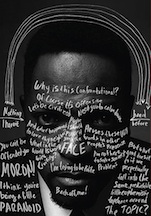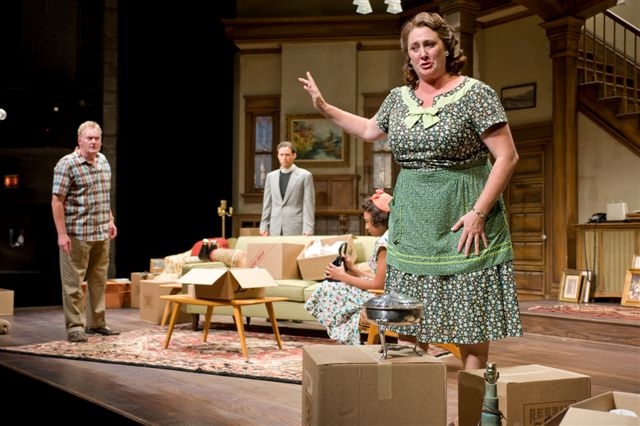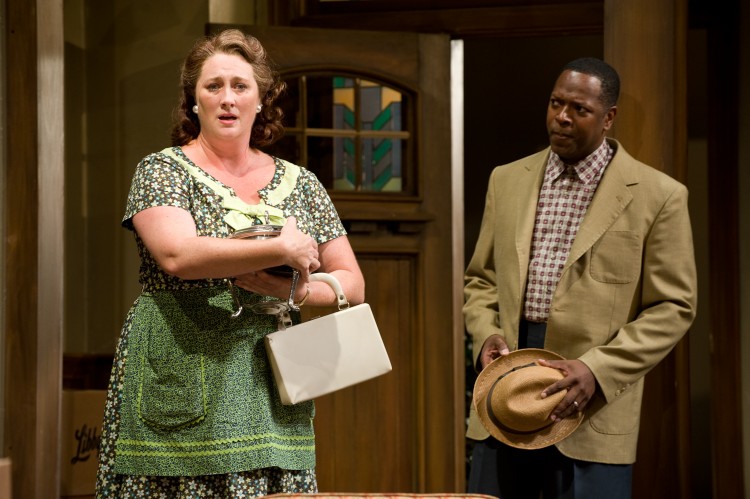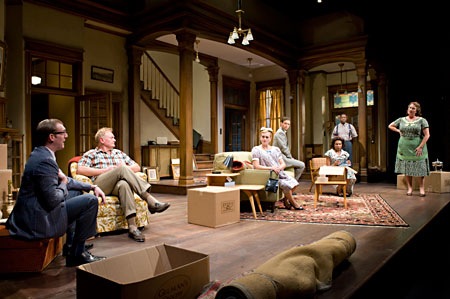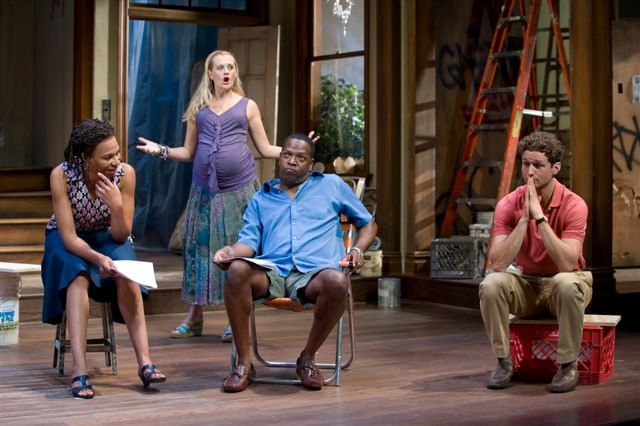TWO PLAYS IN ONE
What is the purpose of theater? Some say that it is to reflect reality while being entertaining, enlightening, and/or educating. Yet when Shakespeare wrote that theatre is designed to “hold, as ’twere, the mirror up to Nature,” his character of Hamlet actually used theatre to shape reality, not merely reflect it. Which leads to the blunt quote attributed to Brecht: “Art is not a mirror to hold up to society, but a hammer with which to shape it.”
The first act of Bruce Norris’s Clybourne Park, as evidenced by the current production at Steppenwolf (where six of Norris’s plays originated) is flat-out some of the most outstanding theater one can witness. Winner of the 2010 Pulitzer Prize for drama and one of the most astoundingly well-constructed and beautifully written first acts of the 21st century, Norris does indeed hold a mirror up to society; in this case, the theme is race relations. With a nod to A Raisin in the Sun, one of the greatest plays of the 20th century, Norris picks up where Lorraine Hansberry left off: it is 1959 and the Younger family from Chicago’s South Side has just purchased a home in Clybourne Park, an all-white neighborhood. The dastardly Karl Linder, the one character left over from Hansberry’s opus, does not want a black family moving into his vicinity. He has just offered the Younger family a tidy sum for the home and returns to convince the previous tenants to rethink the sale.
The second act is a completely different animal than the first: it takes place 50 years later (with the actors assuming modern roles) and the dilapidated home is about to be remodeled, but a relative of the Younger family has taken issue with the home’s historical accuracy (read: the additions will erase the memory of the black family who first arrived in this neighborhood). While Act Two is certainly thought-provoking and entertaining, the playwright’s obvious provocations (hammering home the theme of racism in America) and a particularly disconcerting device to tie the two acts together, keep the ending from being cathartic, as the first act had been. Yet, even though the second half does not stimulate us emotionally, the issue of political correctness bludgeons the audience and there are some raucous laughs to be had; you will be stimulated to discuss not just the subject matter but the way in which Norris presents it.
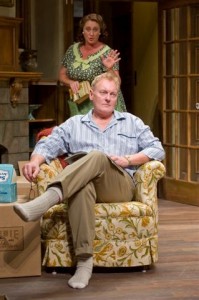 What makes the first act so successful is that we have distinct characters who tug at our heartstrings as they grapple with issues facing 1959 America. Bev (Kirsten Fitzgerald) and Russ (John Judd) are a couple who have lost their son in the Korean War; Bev wants her husband to get over the death of their son, but she doesn’t want to talk about it. Bev is packing and nervously flits from box to box as John casually finishes off a box of Neapolitan ice cream. The delightful dialogue between the two may center on the origin of the word “Neapolitan,” but Norris not only has us laughing at these incredibly distinct characters, he allows us to be immediately tuned in to the conversation that these characters are NOT having (which is successfully done with each of the characters in Act One). Russ’s distance and Bev’s nervousness are the way they deal with stress, but we know there is much more going on underneath. They represent an America that skirts around reality.
What makes the first act so successful is that we have distinct characters who tug at our heartstrings as they grapple with issues facing 1959 America. Bev (Kirsten Fitzgerald) and Russ (John Judd) are a couple who have lost their son in the Korean War; Bev wants her husband to get over the death of their son, but she doesn’t want to talk about it. Bev is packing and nervously flits from box to box as John casually finishes off a box of Neapolitan ice cream. The delightful dialogue between the two may center on the origin of the word “Neapolitan,” but Norris not only has us laughing at these incredibly distinct characters, he allows us to be immediately tuned in to the conversation that these characters are NOT having (which is successfully done with each of the characters in Act One). Russ’s distance and Bev’s nervousness are the way they deal with stress, but we know there is much more going on underneath. They represent an America that skirts around reality.
The sheepish black maid Francine (Karen Aldridge) is doing most of the work and her “Yes, Ma’am,” hang dog responses belie her sorrow and frustration with her station in life. Both she and her husband Albert (James Vincent Meredith) represent the simmering molten lava that will burst forth in the volcanic 60s.
Jim (Brendan Marshall-Rashid) is a neighborhood preacher who has come over to console Russ; his presence keeps others, especially Karl, from coming out and saying what they really want to say. He represents both the way in which we placate each other and the belief systems which effectively keep us from moving forward.
Lastly, we have the infamous Karl (Cliff Chamberlin) and his deaf wife, Betsy (Stephanie Childers), who is a brilliant character creation, for who else could listen to Karl’s rants? These characters represent what we don’t want to see and hear in America.
The characters in the second half, however, are not representations of American mores; they are of the modern daytime talk show where people spew forth opinions with little sense of decorum and civility. This schizophrenic approach to a two-acter may actually necessitate repeat visits to Norris’s play, but both acts in and of themselves will have you concur with The Pulitzer Prize committee: they described the play as “a powerful work whose memorable characters speak in witty and perceptive ways to America’s sometimes toxic struggle with race and class consciousness.”
Steppenwolf’s reputation as an ensemble with the best acting in the country is certainly validated here. The chameleonic efforts dictated by the script are most notable with Karen Aldridge, whose sheepish maid is so distinct from the scabrous Younger relative in the second act that we would never know it was the same actress. Likewise Kirsten Fitzgerald, whose affecting turn as Bev brilliantly morphs into a sassy lawyer and back again.
Lucky were those audience members who stayed for a talkback after the show; we witnessed how Todd Rosenthal’s spectacular set was able to switch from affable suburban home to a ramshackle mess in one intermission. What a shame that this set could not be a permanent museum installation.
As for the discrepancy between the two acts, one wonders if director Amy Morton could have somehow made the ending more effective, especially given her astute and creative leadership. It will be fascinating to see what the Mark Taper Forum will do with Clybourne Park in Los Angeles next year.
photos by Michael Brosilow
Clybourne Park
Steppenwolf Theatre
ends on November 13, 2011
for tickets, visit Steppenwolf
for more shows, visit Theatre in Chicago
